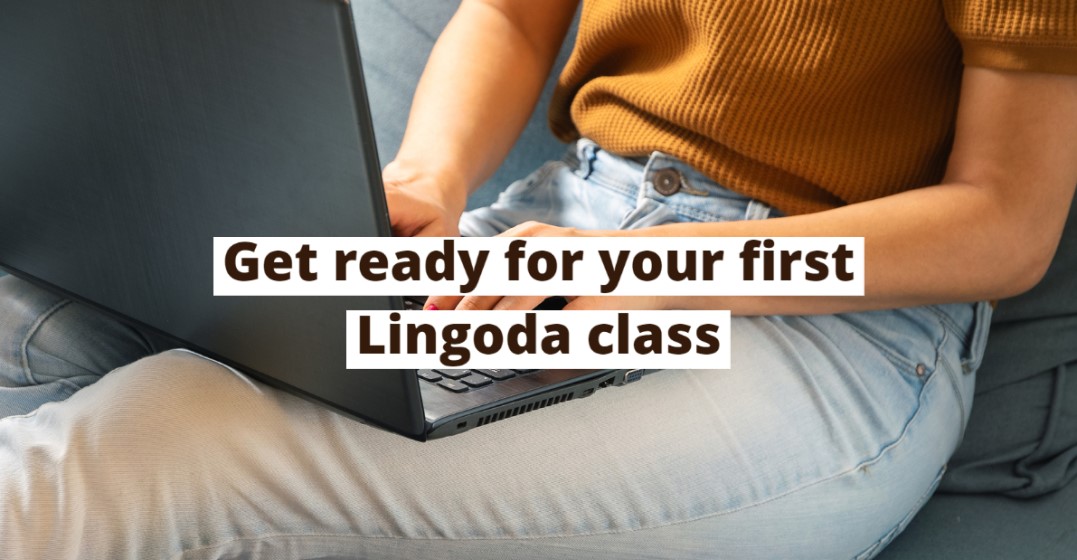Updated on November 7, 2022

9 tips on how to survive your first Lingoda lesson

So you’ve got to know Lingoda a little better. You know who we are and how becoming a student will boost your fluency. But what does a class at Lingoda require? How do you prepare for your lesson and make sure you can survive it, rather than feeling awkward and out of place? Don’t worry: not only will Lingoda’s teachers help, but you’ll also have dedicated classmates and these tips to help you succeed! Here we go:
Check that your technology is working properly. That’s Zoom (the program we use for our online classes), your mic and your internet connection. A class is no fun if the teacher and your classmates cannot hear what you’re saying due to terrible WiFi, not to mention that will slow the entire class down! But what about the camera? Read below…
So you’re excited for your next Lingoda lesson, but unfortunately, you’re not feeling your outfit. You’re having a bad hair day. You just feel particularly comfy in your pajamas and blanket. Do you really need to go on camera? Not really! Grab a cup of tea and make sure your mic is working properly. It’s not mandatory (but it is preferred) to show your face, but speaking will certainly be a part of the lesson!
Make sure you access Lingoda’s dashboard a couple of minutes before your class and click the lesson link as soon as it is available, otherwise you risk missing precious minutes of your lesson. Every minute is learning time for our teachers, so it’s important to be there from the very start!
Students who are just getting started with Lingoda sometimes find it comforting to download the lesson materials beforehand and take a quick look. If you tend to feel nervous easily, you might want to download your materials and scan through them before the lesson to help soothe your concerns about the topic or exercises. Of course, you won’t have to do this all the time. After a couple of lessons, you’ll be more willing to relax and just enjoy!
Introducing yourself in your target language is one of the first skills you learn, but that doesn’t mean you won’t be using it frequently. Lingoda teachers enjoy getting to know their students, and it isn’t unusual for them to ask learners to introduce themselves quickly at the beginning of the lesson. Practise saying your name, where you come from, where you live, what your occupation is and why you want to learn this new language. You won’t have to use it every single class, but you’ll certainly be ready if your teacher asks!
Upper beginner, intermediate and especially advanced level students are often asked to give their opinion about the topic at hand. Can you say whether you agree, disagree or are neutral about a topic and briefly explain why? What topics do you feel more comfortable talking about, and which ones could you improve? Once again, if you feel a specific subject could be challenging, make sure to download the materials beforehand and think of keywords you already know that are related to the lesson’s theme.
Just as you are likely to be asked to introduce yourself or give a basic opinion about a topic, there are other expressions you might want to brush up on in your target language, such as “Can I ask a question?”, “Excuse me, I have a question”, “I don’t understand”, “Could you repeat, please?” or “Can you please give another example?”.
Lingoda’s lessons work with an average of three students. That means everybody will have the opportunity to talk and participate! Surviving your first Lingoda lesson means feeling free to explain your ideas and take chances with new vocabulary, but also being mindful of your teacher’s and your classmates’ talking time.
Don’t be afraid to ask questions. This is your time to learn and get everything in order before going out into the “real” world, so make the most out of it! Your teacher will check in with the class several times throughout the lesson to know if everything was clear. Don’t be shy, speak up! And remember: there is no such thing as a stupid question. Many times, other learners won’t ask questions because they’re shy, but will be thankful that you took the initiative to clarify a topic they were also insecure about.
With an engaged teacher and these tips, you really can’t go wrong. It’s natural to feel a little awkward in your first lesson, but you’ll soon realize there’s nothing to fear. Get your class materials, prepare a couple of key expressions, check your mic and camera settings…and see you there!